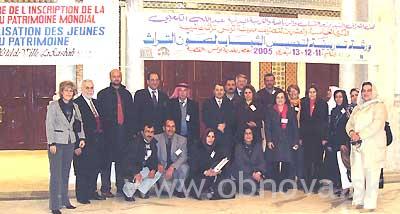Introducing Heritage into School Curricula

In the framework of ICCROM’s ATH?R Programme a three-day workshop entitled “Regional Workshop for the Associated School Project Network (ASPnet) Secondary School Teachers on the Practical Manual: Introducing Young People to Heritage Site Management and Protection” was held in Tunis from 11 to 13 February 2005. The workshop was conducted in collaboration with UNESCO-Amman Office through its ASPnet programme in the Arab Region, and the Regional Secretariat of the Organization of World Heritage Cities (OWHC) for North Africa and the Middle East. Secondary school teachers from nine countries in the Arab Region attended the workshop. ICCROM supported participants from Jordan, Syria, and Lebanon.

This initiative is a follow-up to the World Heritage Skills Development Training Course for Young People in the Arab Region, which took place in Petra, Jordan, in April 2002. One main result of the Petra course was the publication of the manual “Introducing Young People to Heritage Site Management and Protection” aimed at introducing heritage education in school curricula.
The objectives of the workshop were:
To encourage the participation of schoolteachers in conservation and awareness programmes aimed at safeguarding heritage sites and cities in the Arab Region.
To help teachers introduce heritage education in school curricula by providing them with a variety of pedagogic tools.
To test the manual “Introducing Young People to Heritage Site Management and Protection” with ASPnet teachers.
To prepare a revised version of the manual based on the teachers’ comments and suggestions.
Participants:
Ms Mona Abdel-Maqsoud, ASPnet Coordinator, al- Nasr School, Cairo, Egypt
Ms Nida’a Abdeen, Hajj Ishaq Al-Qawasmi School, Hebron, Palestinian National Authority
Mr Lofti Ammar, Coll?ge Secondaire Khezama, Sousse, Tunisia
Ms Fathia aL-ARBI, al-Bina’a School, Tripoli, Lybia
Ms Zainab al-Azzabi, Asbaha Al-Subh School, Tripoli, Libya
Ms Latifa Chaker, General Inspector-Ministry of Education, Tunis, Tunisia
Ms Eva Habich, Ecole Libano–Allemande, Jounyeh, Lebanon
Mr Ahmad Imam, Muharram Bey School, Alexandria, Egypt
Mr Abdel-Razzaq Islambouli, Lycée Français- Libanais, Tripoli, Lebanon
Mr Odeh al- Ja’afreh, Hammoud Secondary School, Kerak, Jordan
Mr Mahmoud Farouk Mohammad, al-Fayyoum School, Egypt
Ms Nouriah al- Na’as, al-Takadum School, Tripoli, Libya
Ms Bahia Najjar, Ecole Officielle Secondaire d’Achrafié, Lebanon
Mr Talal Nassleh, Ibn Khaldoun School, Damascus, Syria
Mr Ali Odibat, Jerash School for Boys, Jerash, Jordan
Mr Munir Saleh, Bashir Al-Rayes Secondary School, Gaza, Palestinian National Authority
Ms Qamar Sbeini, Sate’e Al-Hosari School, Damascus, Syria
Ms Khawater Sha’er, Umma’abed School, Amman, Jordan
Mr Mahmoud al- Sheikh, Jawdat Al-Hashemi School, Damascus, Syria
Member States Represented: Egypt, Jordan, Lebanon, Libyan Arab Jamahiriya, Tunisia and Syrian Arab Republic
Source: ICCROM

